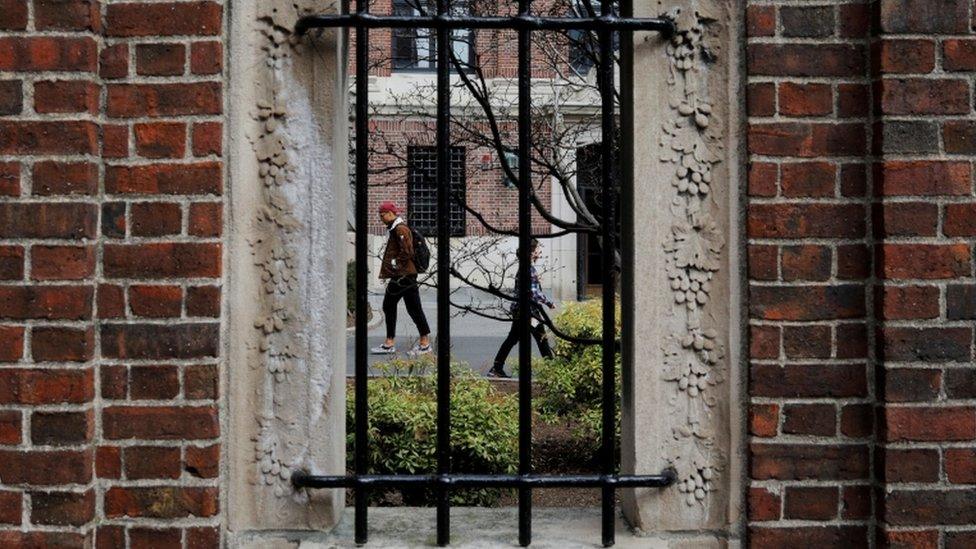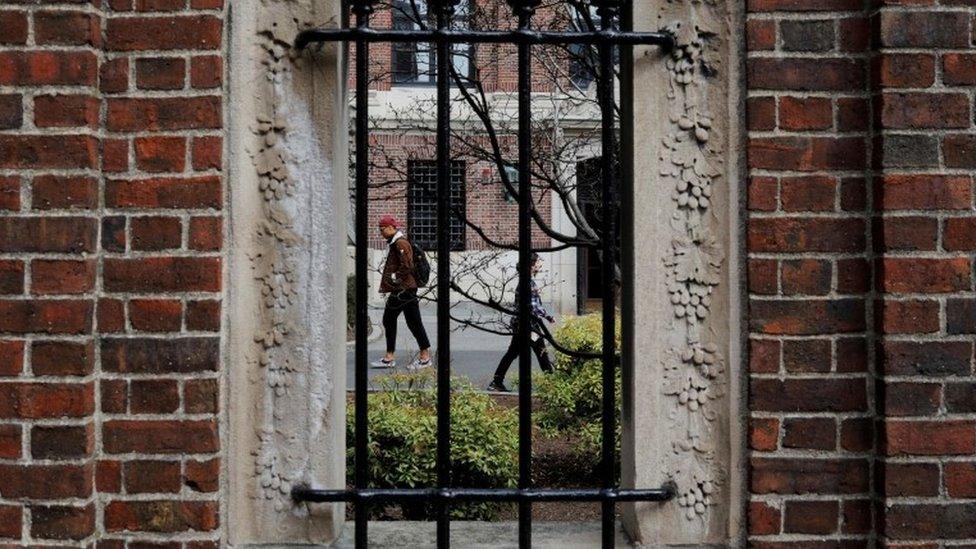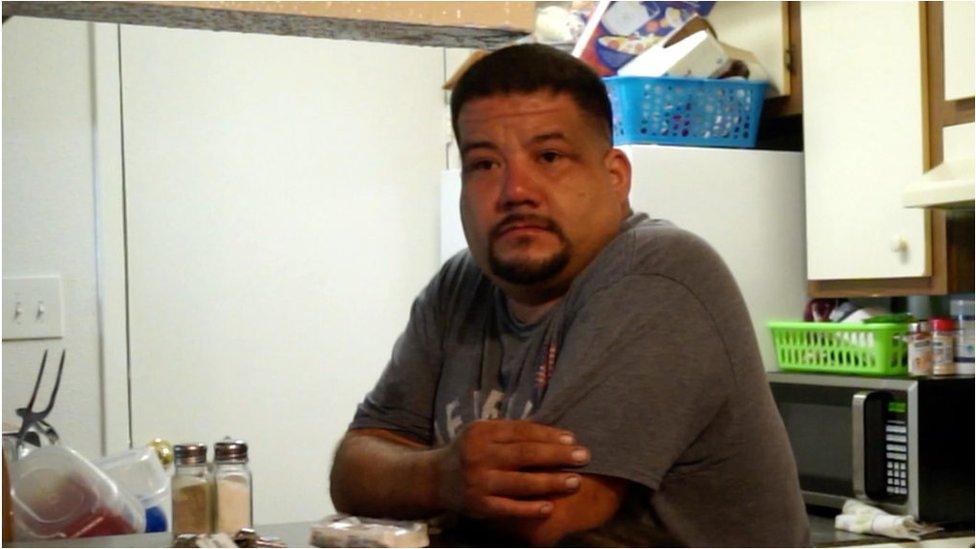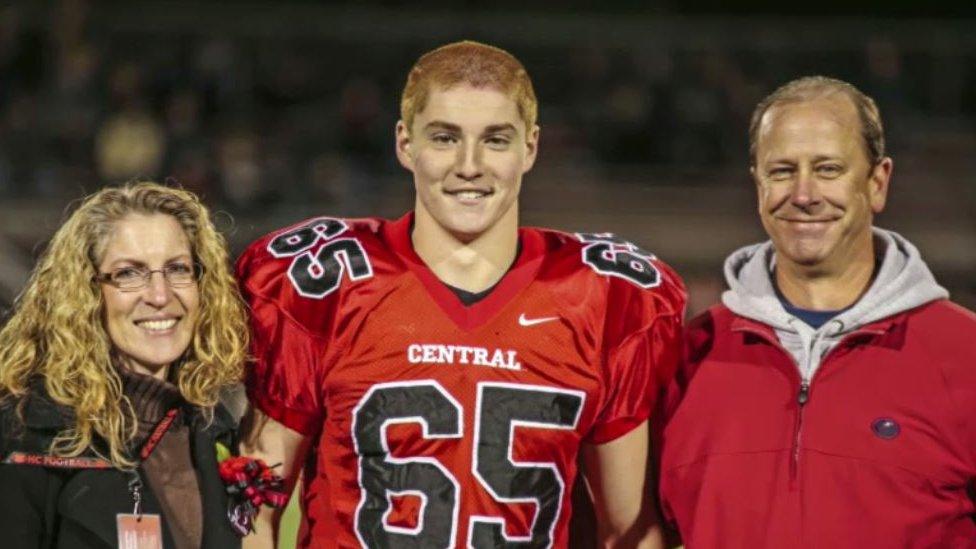Coronavirus: How the pandemic is changing fraternities and sororities
- Published

Pi Kappa Alpha and Sigma Chi fraternity houses in Charleston, South Carolina
Fraternities and sororities form a central part of the university experience for many US students.
But a coronavirus outbreak at the University of Washington in Seattle has raised questions about the pressures the pandemic places on the organisations.
At least 128 students living in fraternity accommodation at the university, external have tested positive for Covid-19, as well as nine of their close contacts. This number could rise, as more than 1,300 tests have been conducted during the past week.
So what challenges does coronavirus pose for fraternities and sororities - collectively known as "the Greek life" - and how are they preparing for the new academic year?
What outbreaks have there been?
A fraternity is an organisation at a college or university, founded on a set of principles that members must abide by and mostly designated by a grouping of Greek letters. They form an integral part of students' social lives and also offer accommodation.
Fraternities are usually - but not always - made up of male students, while female organisations tend to be known as sororities.
According to one report, 9.1% of new students in 2019 said there was a "very good chance" they would join one., external
In addition to the cases at the University of Washington, about a dozen coronavirus cases have also been reported among students and members of staff living in fraternity or sorority accommodation at Georgia Tech in Atlanta since late March, external, including four in the last week. In each case the university said residents had been notified, but did not offer any detail about which of its 56 Greek-named organisations were affected.
Meanwhile, Mississippi's state health officer said last month that parties held by local fraternities had been linked to a number of cases, according to US media.
US authorities have noted that many of the new cases recorded in southern states have been among younger age groups. Although young people are not among the most at-risk groups during the pandemic, they are more likely to spread the virus.
Fauci: "I would not be surprised if we go up to 100,000 a day"
What precautions are being taken?
"Any communal living facilities are going to face challenges with preventing the spread of the coronavirus, which is why we saw nursing homes and cruise ships become major hotspots for Covid-19 early on," Erik Johnson, the president of the University of Washington's Interfraternity Council, told the BBC.
He said precautions had already been taken before the cases at the university were reported, including reduced occupancy in fraternity accommodation over the summer.
"Once we had realised we were dealing with an outbreak, all recruitment was put on pause, our social moratorium was reinforced, and everyone was ordered to be tested immediately," Mr Johnson said.
While the University of Washington faces an unusual situation because its fraternity accommodation remains open over the summer, many fraternities and sororities are now trying to decide which measures to put in place before the new academic year begins.
According to The Chronicle of Higher Education, just over half of US universities are currently planning a full return to in-person teaching, external in the autumn, although this could change.

Harvard says only 40% of students will be allowed to return, with all teaching going online
Some national fraternities and sororities have said they will leave the decision about how and when to reopen to their local branches, as health advice varies between both states and universities, and the situation is changing rapidly.
Others have not been able to finalise their own plans.
"We are still awaiting information on how and when it will be possible to open," the facility company of Gamma Phi Beta, the country's oldest sorority, has said, external.
However, another sorority, Kappa Alpha Theta, says it plans to open its houses in the new academic year where possible.
While it advises its chapters to follow state and university guidelines on issues such as the numbers of students permitted to live in each room, the sorority has introduced its own rules, external, including requirements that each member take their own temperature on a daily basis and wear a mask in common areas of the house.
Those who test positive, meanwhile, will not be allowed to self-quarantine inside the sorority house.
How are they coping?
While larger organisations are likely to be able to reach and enforce similar decisions, smaller fraternities and sororities may struggle to deal with the costs of extensive cleaning and other aspects of the pandemic, according to the North American Interfraternity Conference, which represents 60 fraternities.
Protest, rally or eating out - Where is riskier?
Housing is not the only aspect of Greek life to be affected by the pandemic - the process of recruiting and inducting new members has also changed.
According to the National Panhellenic Conference (NPC), a body which oversees 26 sororities, the main annual recruitment period normally lasts between three days and a week and "gives participants the opportunity to meet the entire sorority community on your campus".
After these events, students are invited to take part in challenges before being accepted as members of the organisation.
While the pandemic has meant many events have moved online or been postponed, it hasn't lessened their importance.
"We must communicate the value of the sorority experience, highlighting the continued relevance and power of sorority during this time of physical separation," the NPC said on its website. It has joined other organisations in turning to social media and messaging apps to find new members.
The oldest society in the US, Phi Beta Kappa, says it will work with chapters wishing to hold virtual induction ceremonies, external but adds that even new recruits unable to attend an induction will still be able to register and become members online.
As an academically selective organisation, the society has also called on chapters to take into account the "many challenges that are affecting this semester" when assessing students' grades.

GLOBAL SPREAD: Tracking the coronavirus pandemic
GLOBAL TRENDS: Where are cases rising and falling?
TRACKER: Coronavirus cases in Africa

- Published6 July 2020

- Published10 September 2021

- Published2 July 2020

- Published20 June 2020

- Published17 November 2017
